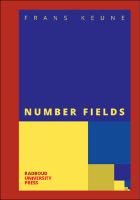Number Fields
Abstract
Number Fields is a textbook for algebraic number theory. It grew out of lecture notes of master courses taught by the author at Radboud University, the Netherlands, over a period of more than four decades. It is self-contained in the sense that it uses only mathematics of a bachelor level, including some Galois theory.
Part I of the book contains topics in basic algebraic number theory as they may be presented in a beginning master course on algebraic number theory. It includes the classification of abelian number fields by groups of Dirichlet characters. Class field theory is treated in Part II: the more advanced theory of abelian extensions of number fields in general. Full proofs of its main theorems are given using a ‘classical’ approach to class field theory, which is in a sense a natural continuation of the basic theory as presented in Part I. The classification is formulated in terms of generalized Dirichlet characters. This ‘ideal-theoretic’ version of class field theory dates from the first half of the twentieth century. In this book, it is described in modern mathematical language. Another approach, the ‘idèlic version’, uses topological algebra and group cohomology and originated halfway the last century. The last two chapters provide the connection to this more advanced idèlic version of class field theory.
The book focuses on the abstract theory and contains many examples and exercises. For quadratic number fields algorithms are given for their class groups and, in the real case, for the fundamental unit. New concepts are introduced at the moment it makes a real difference to have them available.
Keywords
Galois theory; Idèlic version of class field theory; Ideal-theoretic version of class field theory; Abelian number fields; Class Field Theory; Algebraic Number Theory; TextbookDOI
10.54195/IPVU4488ISBN
9789493296039Publisher
Radboud University PressPublisher website
https://radbouduniversitypress.nl/Publication date and place
Nijmegen, the Netherlands, 2023Classification
Mathematics


 Download
Download Web Shop
Web Shop